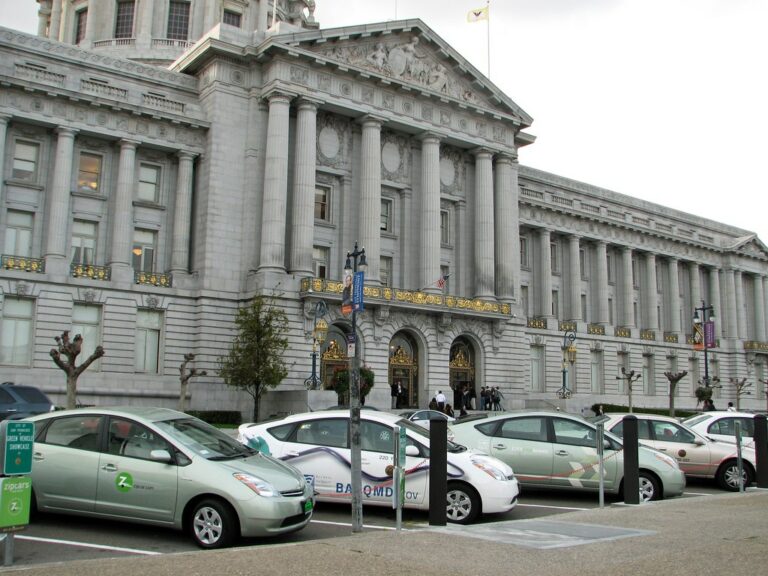Est. Reading Time: 4 minutes
Share this with your network
A version of this post appeared on August 30, 2017 in the Union of Concerned Scientists' blog. The original post can be viewed here. The post is reprinted here with permission.
“Think globally, act locally.”
I first heard this phrase as a child who had just learned about Earth Day at school. To my 11 year old self, it felt empowering; I could help the environment by recycling and conserving water. While the idea of taking action to solve pressing problems continued to inspire me through to adulthood, I’ve recently come to fully appreciate the importance of local action.
After I had spent several years in Washington, D.C., first as a legislative adviser in Congress and then as an analyst in the White House, life brought me to California where I now work as a technologist. Missing my connection to government, I successfully applied for an appointment to a standing task force in my city, Hayward, California. During this time, part of my technology work has included developing data-enabled solutions for distributed renewables such as rooftop solar and on-site batteries. While I left federal government believing I was leaving behind the ability to significantly impact policy issues that mattered to me, the intersection of my professional and my community work have shown me the importance of local government engagement.
Reflecting on my local engagement, two themes have emerged:
- Local governments play a critical role in science-related policy issues, including those with global implications.
We often think of the most pressing science-related policy issues, such as climate change policy, as being national (or global) in nature. While many important policy decisions are made at the national level, local government can also play a significant role both as a testbed for new policy ideas and as the implementation arm for high-level policies. An example of this is vehicle electrification, a solution advocated by Union of Concerned Scientists (UCS) as part of a broader environmental and climate change mitigation strategy. At the national level, the Obama Administration set goals for expanding the number of electric vehicles (EVs) on the road. At the same time, states like California have been pioneering efforts to reduce emissions and encourage vehicle electrification. Municipal and regional governments provide the critical “last mile” for a comprehensive policy strategy. At this level, government policies can be as diverse as switching municipal fleets to EVs, ensuring the availability of charging stations in public garages, incentivizing or requiring EV-charging access in building codes, or implementing special permitting fees for EV chargers. To influence these crucial “last mile” policies, you must look to your state houses and city halls instead of to Washington.
- There are few resources to help people, particularly engineering & science professionals, who want to get involved in their local communities…but we are trying to change that.
Once you appreciate the importance of local engagement, you may find yourself wondering where to start. While scientific professional societies have provided a conduit for informing engineers & scientists about national level policy issues for decades, fewer resources exist for helping people understand the issues and get involved in local (city, state, or regional) government. While a limited number of state-level fellowships provide the opportunity for a small number of engineers & scientists to work in state government, there are even fewer municipal programs.You can, instead, create your own engagement opportunities. Visit your city’s website to read your general plan or learn about initiatives, attend city council meetings, request meetings with your city representatives who are usually happy to meet their constituents, and apply for a board or commission. The latter is a particularly impactful, though too often overlooked, way to engage. Through my own task force involvement, I have had the opportunity to meet with leaders in my community and learn about issues ranging from gang prevention to compliance with Environmental Protection Agency regulations.
Despite its possibilities, local involvement seems to be the exception for people who are interested in science-related policy. Most of the scientists I know are unaware of how they can become involved locally and don’t realize they can have an impact. For this reason, I founded Engineers & Scientists Acting Locally (ESAL).
ESAL is a non-partisan, non-advocacy organization dedicated to helping engineers & scientists increase their engagement in their city, state, and regional governments and communities. We are currently assessing interests and engagement levels of engineers and scientists. If you are a scientist or engineer, please share your interests and experiences with us through this survey. We also invite you to join our listserv to learn more about our future activities and let us know if you’d like to help expand ESAL.
The work of organizations like UCS helps engineers, scientists, and members of the broader public understand the critical role that science and technology plays across policy issues. This awareness has made technically informed discussions an integral part of policy formulation at the federal level. Local governments also grapple with important science-related issues. By getting involved as an engaged citizen, advocate, and volunteer in your local community, you can help shape local policies that align with global solutions.
